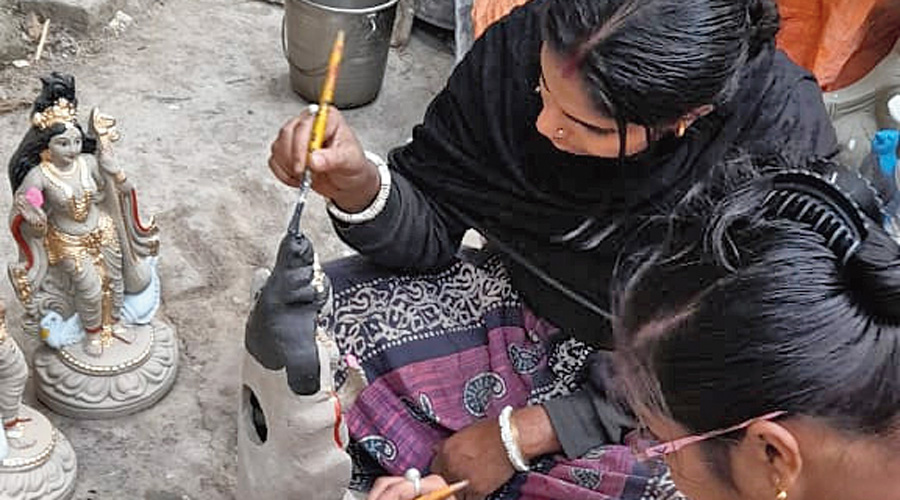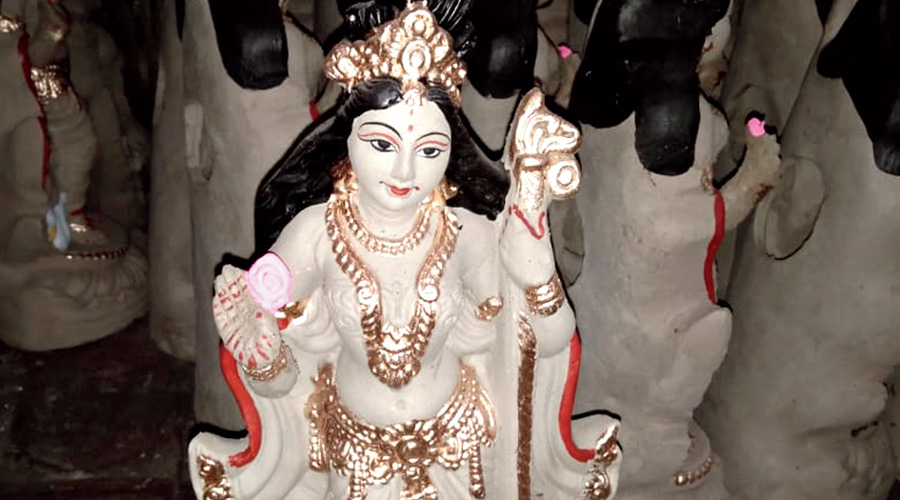Saraswati is appearing in a biodegradable avatar this year. Idols of the goddess of wisdom have been created by women of a Baruipur village, using a mix of clay and cow dung.
“These idols can be immersed at home in a bucket and on being left for a couple of days will completely dissolve in water,” says Bhaswati Basu, a Golpark resident, who has mobilised the women to create the idols.
Even if the idols are immersed in ponds, they will pollute the water much less than the clay idols sold in the market. “This is because our idols are mostly left in the natural state, without colour. We only highlight the hair and the ornaments,” points out Basu. Most colours used by idol-makers are high in chemical content and pollute the water on immersion.
Another problem with the smaller idols sold mostly for domestic use during Saraswati puja is many are made of burnt clay. “Those do not remain biodegradable any more,” she pointed out.

Women put finishing touches to idols in a Baruipur village. Telegraph picture
This is not Basu’s first experiment with the clay-and-cowdung mix. Under her environment-friendly employment generating concern Samvab, she trained women of Joynagar how to make pradip last Diwali, using a moulding machine. “Those worked out well. All 25,000 got sold out,” she said.
Her next experiment was with the women of Moloya village in Baruipur. “I installed a machine there to let them create tubs for garden plants. Those have proved popular too.”
For the idols, she contacted Samir Pal, an idol-maker of Baruipur. “Initially I had refused as it seemed problematic. But when didi (Basu) insisted, I gave it a try. Now I am happy to have done something new,” Pal told Metro.
The two ingredients – clay and dung – are used in equal proportions. To that, he mixes a bit of milk, ghee and yoghurt as the idols are being branded as Panchagavya Saraswati.
“It takes much longer to create as dung by itself lacks binding capacity. Nor does didi allow us to use a chemical we use otherwise to separate the clay form quickly from the die. So just six-seven idols can be made in a day with this mix, compared to 20 or so of pure clay,” Pal said.
He kneads the clay mix himself, filtering out the stone chips, and delivers the lumps at the doors of village women who shape the idols out of plaster of Paris casts. “The labour cost is higher for this as the process is slow. After taking each idol out of the die, they leave it out to dry in the sun for an hour after which it is firm enough to be given the finishing touches. Then it takes two more days to dry it out completely. We made the idols in two sizes — 1 ft and 7 inches,” Pal said. His team made about 50 idols of each size.
Once word went round, villagers flocked to his house to see how the “cow dung idols” were shaping up. “Dung is a part of their daily lives but they never thought it could have a role in idol-making. So they liked the novelty of it,” Pal smiled.
Basu, a former cricketer who kept wickets for the Bengal team from 1977 to 1983, became a trend-setter of sorts in the Durga puja circuit when she collected used flowers from 72 community puja organisers, from Golf Green to Salt Lake, in 2019 to create compost.
This time her target is both saving the waterbodies and helping the villagers. “They make barely Rs 20-25 per idol. By using such alternative ways and materials, the costing is coming up to Rs 300. So they can earn a bit more.”
The idols are being sold under the Samvab logo for Rs 450.










